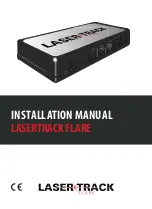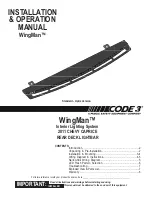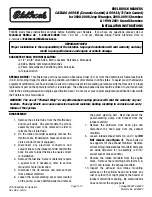
SAFETY FEATURES
Four-Wheel Anti-Lock Brake System (ABS)
The Four-Wheel ABS is designed to aid the driver in
maintaining vehicle control under adverse braking condi-
tions. The system operates with a separate computer to
modulate hydraulic pressure, to prevent wheel lock-up
and to help avoid skidding on slippery surfaces.
The system’s pump motor runs during an ABS stop to
provide regulated hydraulic pressure. The pump motor
makes a low humming noise during operation, which is
normal.
The ABS includes an amber ABS Warning Light. When
the light is illuminated, the ABS is not functioning. The
system reverts to standard non-anti-lock brakes. Turn-
ing the ignition OFF and ON again may reset the ABS if
the fault detected was only momentary.
WARNING!
•
When the ABS intervenes and you feel the brake
pedal pulsating, do not reduce the pressure, but
hold it down firmly and confidently; in doing so
(Continued)
WARNING!
(Continued)
you will brake in the shortest distance possible,
depending on the current road conditions.
•
For maximum efficiency of the braking system, a
bedding-in period of about 311 miles (500 km) is
required: during this period it is advisable to
avoid sharp, repeated and prolonged braking.
•
If the ABS intervenes, this indicates that the grip
of the tires on the road is nearing its limit: you
must slow down to a speed compatible with the
available grip.
•
The ABS can’t overrule the natural laws of phys-
ics, and can’t increase the grip available according
to the condition of the road.
•
The ABS cannot prevent accidents, including
those due to excessive speed on corners, driving
on low-grip surfaces or aquaplaning.
•
The capability of the ABS must never be tested
irresponsibly and dangerously, in such a way as to
compromise personal safety and the safety of others.
•
For the correct operation of the ABS, the tires
must of necessity be the same make and type on
all wheels, in perfect condition and, above all, of
the prescribed type and dimensions.
90 SAFETY
Summary of Contents for 4C SPIDER 2018
Page 4: ......
Page 11: ...REAR VIEW Rear View 1 Rear Lights 2 Decklid 2 GRAPHICAL TABLE OF CONTENTS 9...
Page 14: ......
Page 62: ......
Page 64: ...INSTRUMENT CLUSTER Instrument Cluster 62 GETTING TO KNOW YOUR INSTRUMENT PANEL...
Page 90: ......
Page 138: ......
Page 198: ......
Page 281: ...INDEX 12...
















































